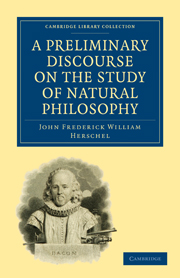Book contents
- Frontmatter
- Contents
- Dedication
- PART I OF THE GENERAL NATURE AND ADVANTAGES OF THE STUDY OF THE PHYSICAL SCIENCES
- PART II OF THE PRINCIPLES ON WHICH PHYSICAL SCIENCE RELIES FOR ITS SUCCESSFUL PROSECUTION, AND THE RULES BY WHICH A SYSTEMATIC EXAMINATION OF NATURE SHOULD BE CONDUCTED, WITH ILLUSTRATIONS OF THEIR INFLUENCE AS EXEMPLIFIED IN THE HISTORY OF ITS PROGRESS
- PART III OF THE SUBDIVISION OF PHYSICS INTO DISTINCT BRANCHES, AND THEIR MUTUAL RELATIONS
- CHAP. I Of the Phenomena of Force, and of the Constitution of Natural Bodies
- CHAP. II Of the Communication of Motion through Bodies. — Of Sound and Light
- CHAP. III Of Cosmical Phenomena
- CHAP. IV Of the Examination of the material Constituents of the World
- CHAP. V Of the Imponderable Forms of Matter
- CHAP. VI Of the Causes of the actual rapid Advance of the Physical Sciences compared with their Progress at an earlier Period
- Index
CHAP. VI - Of the Causes of the actual rapid Advance of the Physical Sciences compared with their Progress at an earlier Period
Published online by Cambridge University Press: 29 August 2010
- Frontmatter
- Contents
- Dedication
- PART I OF THE GENERAL NATURE AND ADVANTAGES OF THE STUDY OF THE PHYSICAL SCIENCES
- PART II OF THE PRINCIPLES ON WHICH PHYSICAL SCIENCE RELIES FOR ITS SUCCESSFUL PROSECUTION, AND THE RULES BY WHICH A SYSTEMATIC EXAMINATION OF NATURE SHOULD BE CONDUCTED, WITH ILLUSTRATIONS OF THEIR INFLUENCE AS EXEMPLIFIED IN THE HISTORY OF ITS PROGRESS
- PART III OF THE SUBDIVISION OF PHYSICS INTO DISTINCT BRANCHES, AND THEIR MUTUAL RELATIONS
- CHAP. I Of the Phenomena of Force, and of the Constitution of Natural Bodies
- CHAP. II Of the Communication of Motion through Bodies. — Of Sound and Light
- CHAP. III Of Cosmical Phenomena
- CHAP. IV Of the Examination of the material Constituents of the World
- CHAP. V Of the Imponderable Forms of Matter
- CHAP. VI Of the Causes of the actual rapid Advance of the Physical Sciences compared with their Progress at an earlier Period
- Index
Summary
(383.) There is no more extraordinary contrast than that presented by the slow progress of the physical sciences, from the earliest ages of the world to the close of the sixteenth century, and the rapid developement they have since experienced. In the former period of their history, we find only small additions to the stock of knowledge, made at long intervals of time; during which a total indifference on the part of the mass of mankind to the study ot nature operated to effect an almost complete oblivion of former discoveries, or, at best, permitted them to linger on record, rather as literary curiosities, than as possessing, in themselves, any intrinsic interest and importance. A few enquiring individuals, from age to age, might perceive their value, and might feel that irrepressible thirst after knowledge which, in minds of the highest order, supplies the absence both of external stimulus and opportunity. But the total want of a right direction given to enquiry, and of a clear perception of the objects to be aimed at, and the advantages to be gained by systematic and connected research, together with the general apathy of society to speculations remote from the ordinary affairs of life, and studiously kept involved in learned mystery, effectually prevented these occasional impulses from overcoming the inertia of ignorance, and impressing any regular and steady progress on science. Its objects, indeed, were confined in a region too sublime for vulgar comprehension.
- Type
- Chapter
- Information
- A Preliminary Discourse on the Study of Natural Philosophy , pp. 347 - 362Publisher: Cambridge University PressPrint publication year: 2009First published in: 1830

